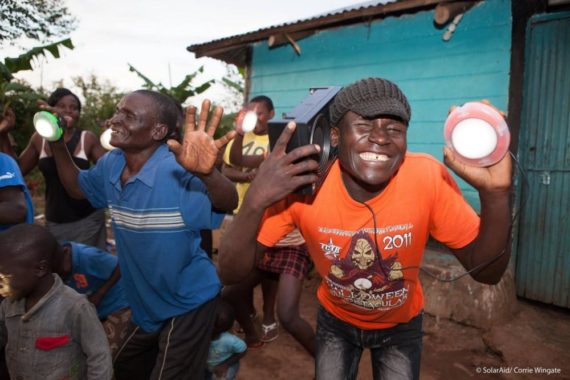
Panasonic Corporation, one of the world’s largest electronics manufacturers, joined the Business Call to Action (BCtA) today with a commitment to improve the quality of life for the people in Africa and Asia by reducing greenhouse gas emissions and providing greater access to energy. The company plans to provide 1 million solar lanterns as a clean and safe light source for people living in regions without electricity by the end of 2018 fiscal year.
Utilizing its expertise in energy solutions, Panasonic has developed a new high-quality and affordable solar lantern with a 3.5-watt solar panel, which provides light for as long as 90 hours. The Panasonic lantern can also charge cell phones by using a USB port. Launched in Indonesia, Myanmar and Thailand in early 2014, these lanterns will soon be available in Bangladesh, Cambodia, Kenya and Malaysia.
Panasonic’s commitment to the BCtA is focused on providing low-income communities with greater access to affordable light, which is especially critical at night. Solar light is a valuable tool that allows children to study after dark; its USB cell phone charger also allows people to benefit from a range of mobile services and generate income by charging other people’s phones.
By replacing kerosene lamps with its solar lanterns, Panasonic is helping to reduce low-income households spending on kerosene, which can cost up to US$100 per year. The solar lanterns will also contribute to eliminating pulmonary sickness caused by kerosene lamps.
For low-income people living in remote areas with no retail stores, Panasonic is establishing its own solar lantern distribution networks in collaboration with local community groups.
According to Sahba Sobhani, Acting Programme Manager of BCtA, Panasonic’s commitment to the BCtA will go a long way to reaching communities in need of solar energy. Especially encouraging is the enhanced access that power can provide in supporting a range of livelihood activities. We are pleased to welcome them to the Business Call to Action.
Replacing kerosene lamps with 1 million Panasonic solar lanterns is estimated to reduce greenhouse gas emissions by over 30,000 tons between 2014 and 2018.
The sale of these 1 million solar lanterns will bring Panasonic US$50 million in revenues. And by introducing its solar lantern as the first Panasonic product to low-income communities, the company plans to enter into emerging markets in Africa and Asia, strengthening product development to improve the lives of people in these regions.
By providing our advanced technologies and products, we believe Panasonic can contribute to the fight against global warming and poverty eradication. Panasonic is greatly honored to be a member of the BCtA, and we look forward to collaborating with its members and partners, stated Takashi Toyama, Managing Director of Panasonic.
